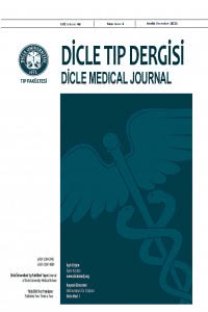Erişkin akne vulgaris hastalarında tedavi öncesi ve sonrası hayat kalitesi
Deri hastalığı, akne tedavisi, derma­tolojik yaşam kalitesi indeksi
Quality of life in adult patients with acne vulgaris before and after treatment
___
- 1. Cook D, Krassas G, Huang T. Acne - best practice management. Aust Fam Physician 2010; 39(9):656-60.
- 2. Sinclair W, Jordaan HF; Global Alliance to Improve Outcomes in Acne. Acne guideline 2005 update. S Afr Med J 2005; 95(11):881-92.
- 3. Do JE, Cho SM, In SI, Lim KY, Lee S, Lee ES. Psychosocial Aspects of Acne Vulgaris: A Community-based Study with Korean Adolescents. Ann Dermatol 2009; 21(2):125-129.
- 4. Tan JK. Psychosocial impact of acne vulgaris: evaluating the evidence. Skin Therapy Lett 2004; 9(7):1-3.
- 5. Grahame V, Dick DC, Morton CM, Watkins O, Power KG. The psychological correlates of treatment efficacy in acne. Dermatol Psychosom 2002; 3(3):119-25.
- 6. Ozturkcan S, Aydemir O, Inanır I. Akne vulgarisli hastalarda yaşam kalitesi. T Klin Dermatol 2002; 12(3):131-4.
- 7. Martin AR, Lookingbill DP, Botek A, Light J, Thiboutot D, Girman CJ. Health-related quality of life among patients with facial acne -- assessment of a new acne-specific questionnaire. Clin Exp Dermatol 2001; 26(5):380-5.
- 8. Rapp DA, Brenes GA, Feldman SR, Fleischer AB Jr, Graham GF, Dailey M, Rapp SR. Anger and acne: implications for quality of life, patient satisfaction and clinical care. Br J Dermatol 2004; 151(1):183-9.
- 9. Lehmann HP, Andrews JS, Robinson KA, Holloway VL, Goodman SN. Management of acne. Evid Rep Technol Assess 2001;21(17):1-3.
- 10. Finlay AY, Khan GK. Dermatology Life Quality Index (DLQI) - a simple practical measure for routine clinical use. Clin Exp Dermatol Clin Exp 1994; 19(3):210-6.
- 11. Ozturkcan S, Ermertcan AT, Eser E, Sahin MT. Cross validation of the Turkish version of dermatology life quality index. Int J Dermatol 2006; 45(11):1300-7.
- 12. Gurel MS, Yanik M, Simsek Z, Kati M, Karaman A. Quality of life instrument for Turkish people with skin diseases. Int J Dermatol 2005; 44(11):933-8.
- 13. Cuhadaroglu F, Yazici KM. Psychiatric symptoms among Turkish adolescents. Turk J Pediatr 1999; 41(3):307-13.
- 14. Davis EC, Callender VD. A review of acne in ethnic skin: pathogenesis, clinical manifestations, and management strategies. J Clin Aesthet Dermatol 2010; 3(4):24-8.
- 15.Acıoz E, Gokdemir G, Köşlü A; Dermatolojide Yaşam Kalitesi. Turkderm 2003; 37(1):16-23.
- 16. Hensen G, Schiller M, Luger TA, Hensen P. Psychological issues in outpatient care of acne vulgaris. Gesundheitswesen 2009;71(7):405-13. 288 H. Akyazı et al. Quality of life in Acne vulgaris
- 17. Lasek RJ, Chren MM. Acne vulgaris and the quality of life of adult dermatology patients. Arch Dermatol 1998; 134(4):454-8.
- 18. Thomas DR. Psychosocial effects of acne. J Cutan Med Surg 2004; 8(4):3-5.
- 19. Rubinov DR, Peck GL, Squillace KM, Gantt GG. Reduced anxiety and depression in cystic acne patients after successful treatment with oral isotretinoin. J Am Acad Dermatol 1987; 17(1):25-32.
- 20. Yazici K, Baz K, Yazici AE, Kokturk A, Tot S, Demirseren D, Buturak V. Disease-specific quality of life is associated with anxiety and depression in patients with acne. J Eur Acad Dermatol Venereol 2004; 18(4):435-9.
- 21. Smithard A. Glazebrook C. Williams HC. Acne prevalence, knowledge about acne and psychological morbidity in mid-adolescence: a community-based study. Br J Dermatol 2001; 145 (2):274-9.
- 22. Fehnel SE, McLeod LD, Brandman J, et al. Responsiveness of the Acne-Specific Quality of Life Questionnaire (Acne- QoL) to treatment for acne vulgaris in placebo-controlled clinical trials. Qual Life Res 2002; 11(8):809-16.
- 23. Kellett SC, Gawkrodger DJ. The psychological and emotional impact of acne and the effect of treatment with isotretinoin. Br J Dermatol 1999; 140 (2):273-82.
- ISSN: 1300-2945
- Yayın Aralığı: 4
- Başlangıç: 1963
- Yayıncı: Cahfer GÜLOĞLU
Antimicrobial activity of galls of Quercus infectoria
Fırat Zafer MENGELOĞLU, Umre METİN, Nesibe ÖZDEMİR, M. Kadir ODUNCU
Pilonidal sinüs tedavisinde rhomboid eksizyon ve limberg fleb onarımı: erken dönem sonuçları
Turgut TEKE, Rukiye METİNEREN, Emin MADEN, Kürşat UZUN
Patient’s knowledge level and expectations about coronary angiography
Ömer ŞATIROĞLU, Mutlu VURAl, Mehmet BOSTAN, Engin BOZKURT
Ekzema herpetikum: olgu sunumu
Halide KAYA, ERDOĞAN ÇETİNKAYA
Giant superior mesenteric artery aneurysm
Ahmet TEMİZ, Mehmet BOSTAN, Ömer ŞATIROĞLU, MUSTAFA ÇETİN, Engin BOZKURT
Erişkin akne vulgaris hastalarında tedavi öncesi ve sonrası hayat kalitesi
Hikmet AKYAZI, Davut BALTACI, Köksal ALPAY, Çiçek HOCAOĞLU
Dev üst mezenter arter anevrizması
Ahmet TEMİZ, Mehmet BOSTAN, Ömer ŞATIROĞLU, Mustafa ÇETİN, Engin BOZKURT
Ortopedik cerrahi sonrası pediatrik olguda bilateral siyatik sinir bloğu
